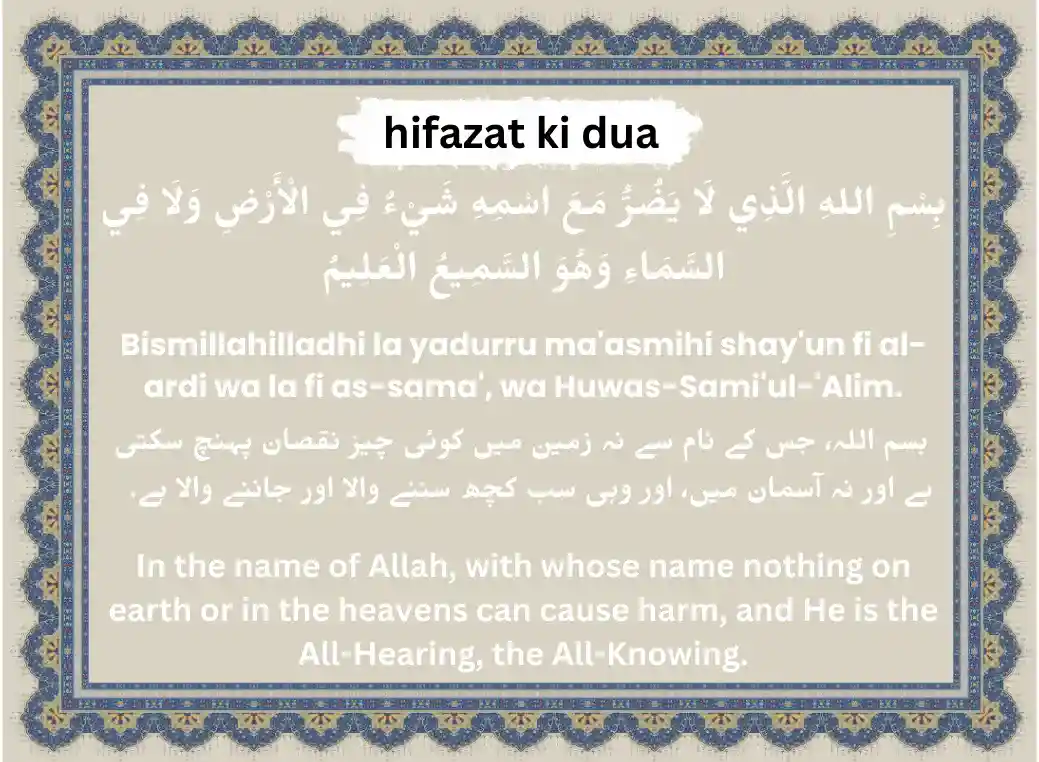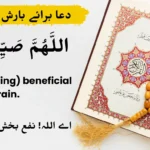In today’s fast-paced and unpredictable world, finding a source of inner peace and divine protection is more important than ever. Hifazat ki dua—the prayer for protection—is a timeless supplication that connects believers with Allah’s boundless mercy and power. This article delves into the significance of Hifazat ki dua, provides authentic Arabic verses with transliteration, and includes Urdu and English translations. Discover how this spiritual practice can enhance your daily routine and safeguard your life.
| What Does Fi Amanillah Mean in Urdu? |
| Wama Arsalnaka Illa Rehmatallil Alameen |
| What are Six Kalimas with Urdu Translation? |
| What are Qurani Dua For Anxiety and Stress? |
Understanding Hifazat Ki Dua
Hifazat ki dua means “prayer for protection.” It is a heartfelt supplication recited to seek Allah’s protection against harm, negativity, and calamities. Rooted in Islamic tradition, these prayers not only strengthen faith but also bring peace and confidence into the believer’s life.
Key Benefits:
- Spiritual Shield: Invokes divine protection to ward off physical and spiritual dangers.
- Daily Empowerment: Regular recitation reinforces your trust in Allah.
- Emotional Balance: Provides mental calm and reduces anxiety through the remembrance of Allah’s protection.
Incorporating this dua into your daily practices can be a transformative experience, serving as a constant reminder of Allah’s safeguarding presence.
Authentic Duas for Protection
Below are two powerful duas that are widely recognized for their protective qualities. Each dua is presented in its original Arabic, along with its transliteration, Urdu, and English translations to help you connect deeply with its meaning.
1. Bismillah for Protection
Arabic:
بِسْمِ اللهِ الَّذِي لَا يَضُرُّ مَعَ اسْمِهِ شَيْءٌ فِي الْأَرْضِ وَلَا فِي السَّمَاءِ وَهُوَ السَّمِيعُ الْعَلِيمُ
Transliteration:
Bismillahilladhi la yadurru ma’asmihi shay’un fi al-ardi wa la fi as-sama’, wa Huwas-Sami’ul-‘Alim.
Urdu Translation:
بسم اللہ، جس کے نام سے نہ زمین میں کوئی چیز نقصان پہنچ سکتی ہے اور نہ آسمان میں، اور وہی سب کچھ سننے والا اور جاننے والا ہے۔
English Translation:
“In the name of Allah, with whose name nothing on earth or in the heavens can cause harm, and He is the All-Hearing, the All-Knowing.”
This dua is a powerful invocation of Allah’s omnipotence, serving as a reminder that His name shields you from every potential harm.
2. Ayatul Kursi (The Throne Verse)
Arabic:
اللَّهُ لَا إِلَٰهَ إِلَّا هُوَ الْحَيُّ الْقَيُّومُ ۚ لَا تَأْخُذُهُ سِنَةٌ وَلَا نَوْمٌ ۚ لَهُ مَا فِي السَّمَاوَاتِ وَمَا فِي الْأَرْضِ ۗ مَنْ ذَا الَّذِي يَشْفَعُ عِنْدَهُ إِلَّا بِإِذْنِهِ ۚ يَعْلَمُ مَا بَيْنَ أَيْدِيهِمْ وَمَا خَلْفَهُمْ ۖ وَلَا يُحِيطُونَ بِشَيْءٍ مِنْ عِلْمِهِ إِلَّا بِمَا شَاءَ ۚ وَسِعَ كُرْسِيُّهُ السَّمَاوَاتِ وَالْأَرْضَ ۖ وَلَا يَئُودُهُ حِفْظُهُمَا ۚ وَهُوَ الْعَلِيُّ الْعَظِيمُ
Transliteration:
Allahu la ilaha illa Huwa, Al-Hayyul-Qayyum. La ta’khudhuhu sinatuw-wa la nawm, lahu ma fis-samawati wa ma fil-ard. Man dhal-ladhi yashfa’u ‘indahu illa bi-idhnihi? Ya’lamu ma baina aydihim wa ma khalfahum, wa la yuhituna bi shai’im-min ‘ilmihi illa bima sha’a. Wasi’a kursiyuhus-samawati wal ard, wa la ya’uduhu hifzuhuma, wa Huwal ‘Aliyyul-Adheem.
Urdu Translation:
الله کے سوا کوئی معبود نہیں، وہ زندہ اور قائم ہے؛ نہ اسے اونگھ آتی ہے اور نہ نیند۔ جو کچھ آسمانوں میں ہے اور جو کچھ زمین میں ہے وہ سب اسی کا ہے۔ کون ہے جو اس کی اجازت کے بغیر اس کے پاس سفارش کر سکے؟ وہ جانتا ہے جو کچھ ان کے سامنے ہے اور جو کچھ ان کے پیچھے ہے، اور وہ اس کے علم میں سے کسی چیز کا احاطہ نہیں کر سکتے مگر جتنا وہ چاہے۔ اس کی کرسی آسمانوں اور زمین کو محیط ہے اور ان کی حفاظت اسے تھکاتی نہیں، اور وہ بلند و عظیم ہے۔
English Translation:
“Allah! There is no deity except Him, the Ever-Living, the Sustainer of [all] existence. Neither drowsiness overtakes Him nor sleep. To Him belongs whatever is in the heavens and whatever is on the earth. Who is it that can intercede with Him except by His permission? He knows what is [presently] before them and what will be after them, and they encompass not a thing of His knowledge except for what He wills. His Kursi extends over the heavens and the earth, and their preservation tires Him not. And He is the Most High, the Most Great.”
Ayatul Kursi is celebrated as one of the most powerful verses in the Quran. Its regular recitation is believed to establish a protective barrier around you, guarding against both visible and invisible threats.
How to Recite Hifazat Ki Dua for Maximum Impact
For optimal spiritual benefits and enhanced well-being, follow these simple yet powerful guidelines when reciting this dua:
- Prepare Your Mind and Heart:
Begin with a sincere intention. Clear your thoughts and focus solely on connecting with Allah. - Choose a Quiet Space:
Find a peaceful and undisturbed environment to recite your dua. This helps enhance concentration and deepens your spiritual experience. - Recite Consistently:
Make Hifazat ki dua a part of your daily routine—ideally after your regular prayers—to create a continuous shield of protection. - Reflect on the Meanings:
Understand the translations and significance behind each word. This reflection not only strengthens your faith but also enriches your spiritual connection. - Integrate into All Areas of Life:
Whether facing challenges or enjoying moments of tranquility, let Hifazat ki dua remind you of Allah’s constant care and support.
The Transformative Benefits of this dua
Integrating this dua into your life can bring about a remarkable transformation:
- Enhanced Spiritual Connection:
Strengthen your bond with Allah and experience a deep sense of trust and reliance on His protection. - Mental Clarity and Emotional Calm:
Regular recitation provides mental peace, helping to reduce stress and anxiety while instilling emotional stability. - A Divine Shield:
By invoking Allah’s name, you create a spiritual barrier that safeguards you from negativity and harmful influences. - Empowered Living:
The confidence gained through divine protection empowers you to face life’s uncertainties with hope and resilience.
Conclusion
Hifazat ki dua is not just a recitation—it is a vital connection to the divine power of Allah. By embracing these authentic prayers, you invite His blessings and protection into every aspect of your life. Whether you choose the succinct Bismillah dua or the profound Ayatul Kursi, these supplications serve as your spiritual armor in both peaceful and challenging times.
Embrace this dua today and let Allah’s divine protection guide and secure your every step.
FAQs
Hifazat ki dua is essential in Islam as it invokes Allah’s protection, reinforcing faith and offering spiritual comfort. It acts as a safeguard against both physical and spiritual harm, providing believers with a sense of security.
Reciting this dua is most beneficial after your daily prayers, during moments of distress, or as part of your morning and evening routines. This consistent practice ensures a continuous channel of divine protection throughout your day.
Yes, integrating this dua into your daily routine not only enhances your spiritual connection with Allah but also contributes to mental clarity and emotional stability, ultimately leading to improved overall well-being.
By embracing Hifazat ki dua and incorporating it into your daily practices, you are not just reciting words—you are forging a strong spiritual connection that can transform your life. Let these divine supplications be your constant reminder that with Allah’s protection, you are never alone in facing life’s challenges.




